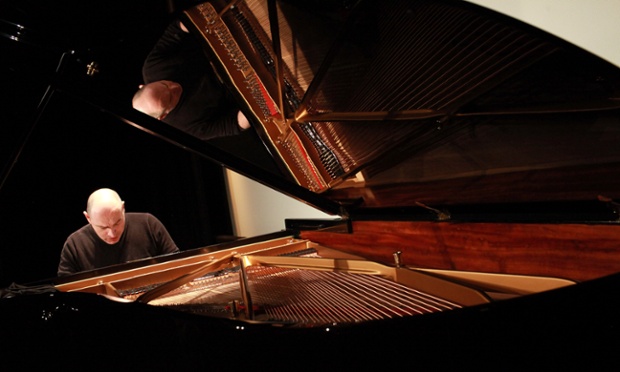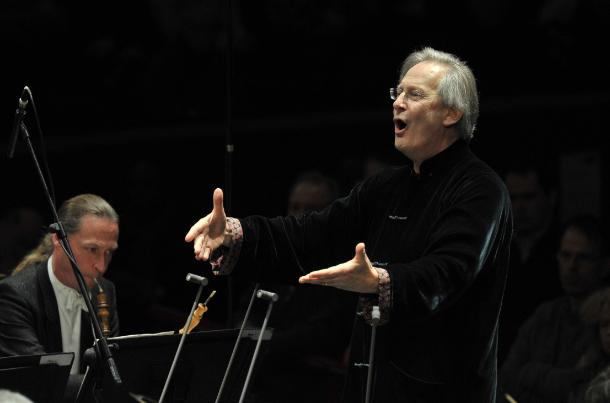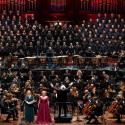Bach for breakfast, lunch and supper. That in essence was what yesterday's Bach Marathon was about. You can do that with Bach - have him flowing from the taps. Nothing new in this for those of us who experienced the Bach Christmas a few years back on Radio Three, when every note was piped over the airwaves for breakfast, lunch and supper for 10 days solid. Nothing very marathon-like about any of it, though, either. The day’s performances couldn’t have been further from a challenge to sit through or listen to.
At the centre of this day of praise was the all-seeing, all-controling, all-chattering presence of Gardiner, one minute shaping the superb Monteverdi Singers and English Baroque Soloists, the next discussing Bach’s feminist credentials. The period movement gets a lot of stick for its dour academicism, its party-pooper Puritanism. And Gardiner, with his Inquisition-like musical purges early on in his career, must be blamed for some of that misperception. But things have moved on and yesterday was a perfect example of how far.
No one else makes you feel like you’re getting under the skin of Bach's music like Gardiner
Austerity, self-abnegation, academic self-restraint, was not in evidence in any of the day's characterful and big-hearted performances. Generosity was all-pervasive, although, ironically, a lack of funds prevented our breakfast session beginning with a St John Passion. Instead we got an opening cantata for double choir, Singet dem Herr nein neues Lied, BWV 225, that made for a very decent dramatic stand-in. With a simple instrumental quartet between them, each set of singers could lash the other with wave upon wave consonant-rich attacks.
Next up came the toughest and grandest of the cello suities, No 6 in D major. The piece requires a five-string cello for anything approaching a comfortable play. Alban Gerhardt made do with four. (Fellow cellist Matthew Barley thought Gerhardt could probably do it on three.) And he certainly seemed amazingly relaxed in the treetops, twiddling around softly and at speed. But it wasn’t just fingerboard virtuosity that dazzled. Gerhardt’s bow control, always careful and clear in projecting each note into the hall, elicited the most magical and surprising series of shifts in texture and luminosity.
Many more miracles came in Joanna MacGregor’s limpid, creative account of the Goldberg Variations. There was so much to admire in this rendition: her liquid treatment of melody, her singing bass lines, her lightness of touch, her rhythmic bounce. But it was the phrasing of the dark gems at the heart of this work that made it really special, the way she allowed the exuberant Variation 22 to fall under the minor-key spell of 21 and then permited 23 to scamper out from underneath all this daydreaming.
Even more nonconformism came with Viktoria Mullova and her suffocatingly brilliant take on the great Ciaconna. Lodging her boot agains the Second Partita’s windpipe, the piece delivered its power through an anguished but gripping breathlessness. No monumentalising for Mullova, this was a performance that built with quiet purpose and killer intent, the highlight undoubtedly the slow crescendo during the extended broken chords at the end of the first part. Honest, original and supremely affecting.
Woven through these performances were talks and panel discussions, one of whose most lively contributors, Professor John Butt, delivered a beautifully stopped organ recital late in the afternoon. Gardiner returned for the finale, a performance of the Bach B Minor that was as much about individual triumphs as ensemble ones. The flutes of Rachel Beckett and Christine Garratt, the oboe of Michael Niesemann, the violin of Kati Debretzeni and the voices of Hannah Morrison and Esther Brazil and Meg Bragle were all outstanding.
There’s no doubt that period competitors have caught up with and to some degree overtaken Gardiner’s ensembles. Colleagues in Europe can certainly match the flexibility and sensitivity of the English Baroque Soloists and Monteverdi Choir these days, but no one comes close to Gardiner’s understanding of these works. No one else makes you feel like you’re getting under the skin of Bach's music like Gardiner. No other conductor melds word and musical action, instinct and intellect, into such an effective whole.
Go to the next page for Nick van Bloss review
Nick van Bloss, Institut Francais
A festival called It’s All About The Piano! took place last week at the Institut Francais, where the highlight was another performance of the Goldberg Variations, the first in Britain by Nick van Bloss (pictured below right) since his widely acclaimed recording of the work. It didn’t disappoint. With the Steinway hogging the Cine Lumiere’s main cinematic stage, anyone else might have made us feel shortchanged by this preponderance of abstract music and lack of visuals. But Van Bloss dealt with that.
 Like MacGregor's yesterday, Van Bloss’s take on these variations was fantastically idiosyncratic. It followed no rule book. In fact, to an extent it took the rule book apart with its spread chords, doubled octaves and ritardandos galore. It was the sort of performance that might have given John Eliot Gardiner a heart attack once upon a time. But this wasn’t piano playing. This was cinema: vivid, arresting, ferociously modern, each variation jump cutting into the next.
Like MacGregor's yesterday, Van Bloss’s take on these variations was fantastically idiosyncratic. It followed no rule book. In fact, to an extent it took the rule book apart with its spread chords, doubled octaves and ritardandos galore. It was the sort of performance that might have given John Eliot Gardiner a heart attack once upon a time. But this wasn’t piano playing. This was cinema: vivid, arresting, ferociously modern, each variation jump cutting into the next.
There was a bit of Gould in the articulation, in the caprice and steely attack. The minor key narratives were drained of sentimentality and offered up cold and savage. Fingers became careering hit squads, dissonant harmonies explosives to further disrupt and disturb. This was the Goldbergs as you’ll never have heard them: as a Tarantino-like display of violent energy and virtuosic choreography.














Add comment